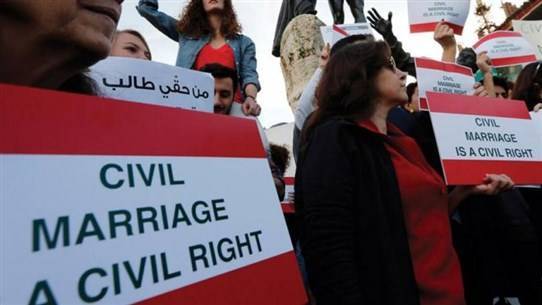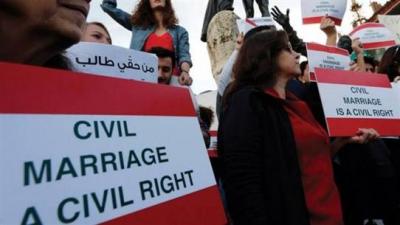Around seventy couples who have chosen to marry civilly in Lebanon or have delayed formalizing their marriages contracted abroad face numerous administrative issues due to the Ministry of Interior's refusal to register their marriages, and consequently, the births of their children. This includes a complete rejection of acknowledging recent marriages conducted remotely via electronic applications. About a year ago, Khalil Rizkallah and Nada Naimah held their civil wedding remotely via Zoom, assisted by a judge in the state of Utah, USA. The couple took the legal route to register their marriage contract through the Lebanese embassy in Los Angeles, followed by the Lebanese Foreign Affairs Ministry and then the Interior Ministry. The contract was registered, and they obtained a family registration certificate, only to be surprised today by the complete elimination of their marriage from the General Directorate of Personal Status records, under the pretext that the marriage was conducted on Lebanese soil, thereby subjecting them to Lebanese law instead of the state through which this marriage was contracted!
Rizkallah expresses his astonishment at this decision, describing it as "arbitrary" during a call with "Al-Akhbar," and emphasizes that he possesses all the legal documents for the marriage. He clings to the acknowledgment of the contract by the Lebanese embassy and insists on its registration in the civil registry, especially since the implications of this matter affect children. Khalil has become a father to a "registered birth," born about a month ago in the United States, but he has been deprived of the right to register him in Lebanon after the cancellation of his parents' marriage, thus depriving the child of many rights regarding education, healthcare, and travel.
In response to this step, Rizkallah filed an objection with the Interior Ministry, speaking of political and religious pressures to suppress online marriages, despite their legality and Lebanon's recognition of their documents. He sarcastically mentions the Ministry's suggestion for him to travel to Cyprus and re-marry there to be able to register his marriage!
This reality affects nearly seventy similar cases, some of which succeeded in registering their first child but ceased registering subsequent ones, as was the case with Khouloud Sakariyeh and Nidal Darwish, the couple who were the first to marry civilly in Lebanon and had their marriage registered before the state backtracked. They registered their eldest son "Ghadi" in Lebanon after obtaining a family registration document, but Sakariyeh did not seek to register her second child "Ralph," born in Sweden, following the previous Interior Minister Nihad Mashnouk's decision to stop the documentation of marriages in Lebanon.
**Turning to the Courts**
Numerous complications surround civil marriage, which has gone through various phases in Lebanon. Some Lebanese had high hopes for it, especially 13 years ago after the issuance of a circular to remove sectarian registration from personal status records, opening the door for the first civil marriage registered in Lebanon in 2013. However, the matter became mired in political bickering and religious authorities, with the registration of marriages halting during the tenure of former Interior Minister Nihad Mashnouk after his refusal to sign contracts, continuing this trend with the following Interior Ministers up to today.
Notary public Joseph Bashara, who registered the marriage of Sakariyeh and Darwish, discusses the many obstacles that prevent the registration and documentation of civil marriages in the personal status department, "which has driven many to document their marriage religiously against their wishes, or travel abroad." Bashara encourages individuals in these situations to "turn to the competent judicial authorities to compel the concerned employee not to violate the law, after which a family registration document can be issued, allowing individuals to obtain their rights in health insurance, travel, and more. Otherwise, 'the incident happens, and they are deprived of their civil rights.'"
Lawyer Abbas emphasizes this issue, pointing out the problem of "the absence of registering children and consequently depriving them of their other rights such as inheritance, which the wife is also denied." This occurs due to the absence of any law regulating these civil marriages, and how it complicates situations where disputes arise between spouses concerning custody, leading to questions of who decides those issues?
**From Civil to Religious**
With this file frozen, religious courts have joined in undermining the format of civil marriage and benefiting from its non-registration in Lebanon. This happened with director Saeed Marmouk and his ex-wife Jihan Abu Aayed, who married civilly in 2017. When a dispute arose, Marmouk turned to the Sunni Sharia court, which relieved him from the obligations of civil marriage in case of separation, exploiting a legal loophole in this case since the couple belongs to the same sect and the civil marriage contract is not registered under any circumstances.
Lawyer Ali Abbas explains to "Al-Akhbar" this loophole preventing two spouses belonging to the same sect from registering their civil marriage and not relying on it in case of a dispute or divorce, leading one of them to "liberate" themselves from the "shared financial responsibility" through the Sharia courts, as Marmouk did.
**Between Domestic and Foreign**
Lawyer Brigitte Chelbian distinguishes between marriages contracted inside and outside Lebanon, as they differ in administrative processes. After contracting their civil marriage outside Lebanon, couples must go to the Lebanese embassy in the country where the marriage took place to transfer the document to the Lebanese Foreign Ministry and then to the personal status department. This is a lengthy journey that this document will undoubtedly travel before it is legally verified in Lebanon. As for those married within Lebanese territory, Chelbian states that their marriage contracts are not recognized due to the absence of a specific law regarding personal status, thus depriving them of their right to register the marriage. This extends to births, leading to a new category of unregistered births emerging.
The situation is no better for those who married civilly outside Lebanon; if the registration process takes too long, they will also join those who married within, and their children become unregistered. Chelbian sees the solution in hastening the registration of marriage at Lebanese embassies on one hand, and on the other, waiting for the approval of a specific civil law for personal status, which would then allow for the automatic registration of births. In the case of disputes between spouses, Chelbian believes it is essential to "refer back to the laws of the country where the marriage took place and adhere to its rulings, or else enter into a quagmire of civil and religious courts, which lack direct authority over civil marriage rulings."




